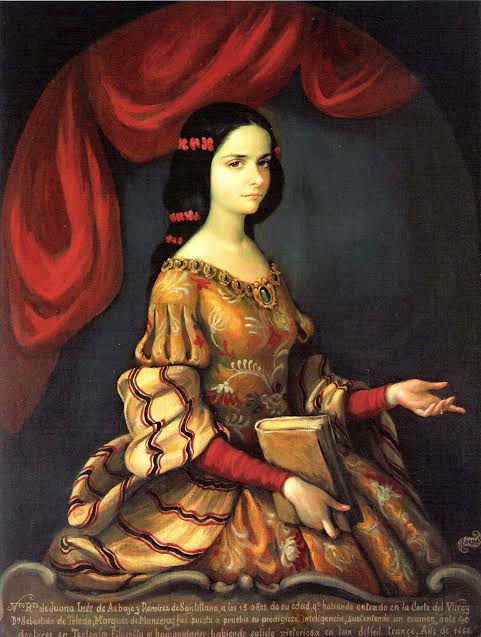<< Hide Menu
3.3 “Hombres necios que acusáis” – Sor Juana Inés de la Cruz
8 min read•june 18, 2024
Alejandra Ramos
Alejandra Ramos
Sor Juana Inés de la Cruz, a prominent poet and thinker from Mexico in the 17th century, wrote "Hombres necios que acusáis" which is very powerful and calls out social norms still present today. Sor Juana confronts men's hypocrisy and double standards in her sharp and moving lyrics, exposing the inequality and cultural expectations for women at the time.
Context Behind “Hombres necios que acusáis”
Author Background
“Hombres Necios que accusáis” was written by Sor Juana Inés de la Cruz in 1689. Sor Juana Inés de la Cruz was considered a feminist in Mexico and also a social and political threat because she greatly challenged social norms and gender roles. She wanted to improve herself and study, but during this time women had two options. Their two options were to get married or to become part of a convent, and she decided to become part of a convent instead of getting married. In the convent, she was able to educate herself a little more, but even so, she challenged what was happening during that time.

Image Courtesy of Ms. Magazine
Time and Place
📜 Historical: Sor Juana Inés de la Cruz wrote the poem "Hombres necios que acusáis" in the late 17th century, during the Spanish colonial era in Mexico. It was written during a period in which women's voices were silenced and their intellectual aspirations were discouraged.
🗺️Geographic: The poem is geographically located in the area of what the Spanish Empire was conquering which included modern-day Mexico, Central America, and parts of the southern United States, The power dynamics and societal standards that were prominent at the time were impacted by the colonial setting of New Spain. More specifically, it was written in a colony in Mexico.
Societal Context
🗳️ Political: The poem was written under Spain's King Charles II and the colonial government under New Spain's rule. The hierarchy of Spanish colonial culture is depicted in the poem, as well as the predominance of men in positions of authority whereas women were required to adhere to traditional gender roles. Women were often belittled by men and this was something that was politically accepted. Sor Juana Inez de la Cruz's poem was considered a form of protest and advocacy because it exposed this wrong in the hierarchy.
🧑🏽🤝🧑🏻Socio-economic: The socioeconomic difference between men and women in terms of education, social standing, and economic prospects is highlighted in the poem. It criticizes the double standards that society imposes on women and the limited agency they have, as well as the hypocrisy of males who simultaneously adore and despise women. This is important because socially, women were expected to behave in very different ways and ways that contradicted one another to keep all groups happy while never being able to pursue their hopes or ambitions.
Literary Devices in “Hombres necios que acusáis”
- Cuarteto - "Hombres necios que acusáis" is structured as a cuarteto, which consists of four-line stanzas. Each stanza presents a concise and self-contained idea, allowing the poet to address different aspects of societal criticism and gender inequality.
- Octosílabo - The poem is composed of octosyllabic verses, having eight syllables in each line. This meter gives the poem a rhythmic and musical character that enhances the flow and emphasizes the poet's point.
- Retruécano - Sor Juana Inés de la Cruz uses the retruécano rhetorical method, which includes reversing or otherwise altering the order of words or sentences when repeating them. By using this method, the poet can show the paradoxes that women experience and question societal norms while also adding a depth of complexity to the work.
- Paradoja - Sor Juana makes use of contradictory statements all throughout the poem to express her disapproval of masculine behavior and the unfair treatment of women. The reader is prompted to carefully examine the conventional gender roles and power relations by these paradoxes, which reveal the inconsistencies and irrationality of society's expectations.
- Antítesis - The poem contrasts the actions and attitudes of males toward women with many opposing terms. Sor Juana exposes the hypocrisy and double standards present in society by contrasting opposing viewpoints, revealing the paradoxes present in how women are treated.
- Imagen - Sor Juana Ines de la Cruz uses imagery to help advocate for her cause and to try and paint the scenarios in which inequalities in social circumstances are present and how they are unfair.
- Tono - "Hombres necios que acusáis" has a critical and rebellious tone. In order to challenge the prevailing patriarchal standards, Sor Juana uses a confrontational tone, calling out men's hypocrisy and demanding equal treatment between women and men. She calls on society to consider its prejudices in a tone that is both assured and defiant.
- Aliteración - Alliteration, or the repetition of consonant sounds, is used throughout the poem to establish rhythmic patterns and raise the musicality of the verses. Alliteration gives the poem a lyrical aspect by adding melodic effects that draw the reader in and reinforce the poet's point.
Summary of “Hombres necios que acusáis”

Image Courtesy of Cultura Genial
Sor Juana Inés de la Cruz wrote "Hombres necios que acusáis" in the 17th century. The poem is a criticism of men's hypocrisy and the social demands placed on women. Sor Juana skillfully challenges the prevalent patriarchal customs of her time by exposing the double standards that women must contend with. The poem's opening lines, "Hombres necios que acusáis / a la mujer sin razón" (Foolish Men Who Accuse Women Without Reason), draw attention to the unfair accusations and blame aimed at women. She continues to discuss the paradoxes that women experience by stating how men accuse women without justification.
Sor Juana also responds to the lack of chances for women in education and intellectual pursuits. In the poem's concluding line, "Pues, ¿para qué os espantáis/de la culpa que tenéis??" she questions the inequality and hypocrisy of men's behavior in a mocking tone to make them realize that it is their fault and that they have to change their behaviors for progress.
Sor Juana aims to jolt males into acknowledging their own responsibility and cooperation in maintaining inequality and double standards by utilizing a sarcastic and mocking tone in her last sentence. She urges that males accept the shortcomings in their actions and move society forward.
Themes in “Hombres necios que acusáis”
La construcción del género
The construction of gender is a central theme in "Hombres necios que acusáis." Sor Juana Inés de la Cruz criticizes how society imposes rigid and restrictive roles on women, denying them the freedom to develop intellectually and forcing them into a subordinate position. Through satire and irony, the poet questions this construction of gender and the roles each one has, inviting us to reflect on the injustice and oppression that it entails.
El machismo
El Machismo is recurring in all of the remarks made in the poem. Sor Juana denounces how men blame and accuse women without justifiable reason. Machismo perpetuates gender inequality by imposing oppressive norms and expectations on women, as seen all throughout the poem, and by exposing the demand for male approval from one another and the inability to accept critics.
El sistema patriarcal
"Hombres necios que acusáis" also addresses the patriarchal system entrenched in society. Sor Juana reveals how this system gives men power and control while relegating women to a role of submission and obedience. Sor Juana Ines de la Cruz underlines the contradiction of the patriarchal system, where men demand submission while refusing to grant women what they ask for. Sor Juana's poem criticizes and challenges these power structures, seeking to raise awareness of the need for social and gender transformation.
Analysis of “Hombres necios que acusáis”
** This is in Spanish to not disrupt the flow of the poem or its interpretation!**
“Hombres Necios que acusáis” fue escrito por Sor Juana Inés de la Cruz en 1689. Sor Juana Inés de la Cruz era considerada una feminista en México y también una amenaza social y política porque desafiaba mucho a las normas sociales y los roles de género. Ella quería mejorarse y estudiar, pero duranta este tiempo las mujeres tenían dos opciones, de casarse o de hacerse parte de un convento, y ella decido hacerse parte de un convento por la contra que le llevaba a el matrimonio. En el convento se pudo educar un poco más, pero, aun así, desafiaba lo que estaba pasando durante ese tiempo. Los versos van dirigidos a los hombres durante ese tiempo. Se les está acusando de que, para ellos, la manera de la que una mujer se comporta nunca los va a contentar.
Sor Juana Inés de la Cruz explica como siendo mujer más reservada, hace que los hombres no les gusten a ellos estas mujeres. Mirando a la parte del fragmento que dice “por que queréis que obren bien si las incitáis al mal,” Sor Juan Inés de la Cruz se está refiriendo a que, si las mujeres actúan bien y son reservadas, los hombres van a querer que no sean así. Ellos les van a poner tentación para que actúen diferente porque no están satisfechos con la manera de la cual están actuando.
En el otro caso, si las mujeres no son reservadas, se les pone el título de “fáciles” y a los hombres, como con las mujeres que son reservadas, tampoco les gusta esto. Los hombres no les gusta esto y es lo que Sor Juana Inés de la Cruz continua a explicar. Se puede usar la misma línea de referencia que con la de las mujeres reservadas por que los hombres son los que tratan de que las mujeres no sean reservadas, “las incitáis al mal,” pero quieren que no sean así “quieres que obren bien.”
Sor Juana Inés de la Cruz está acusando de que los hombres cambian a las mujeres, pero aun así nunca están satisfechos y no hay una zona media entre los dos títulos con los cuales ellos se refieren a las mujeres. Ella está diciendo que los hombres no tienen la razón de acusar a las mujeres por el comportamiento que ellas tienen porque ellos fueron los que lo causaron. Esto se puede reflejar en las líneas “hombres necios que acusáis a la mujer sin razón, sin ver que sois la ocasión de mismo que culpáis.” Para Sor Juana Inés de la Cruz, las mujeres son lo que los hombres han querido que fueren y son el resultado de eso y por esa razón, ellos están equivocados en echarle la culpa a las mujeres si les pertenece a ellos.
Take away: “Hombres Necios que Acuciáis” refleja mucho sobre el tiempo en el cual estaba viviendo Sor Juana Inés de la Cruz. Las mujeres tenían que logar satisfacer a los hombres cuando lo que ellos querían nunca era constante y ella escribo sobre esto y los acuso de eso. Sor Juana Inés de la Cruz, por esta obra y por muchas otras cosas, era una feminista durante ese tiempo que no se iba a quedar callada sobre sus pensamientos e iba a estar en contra de las normas social.

© 2024 Fiveable Inc. All rights reserved.